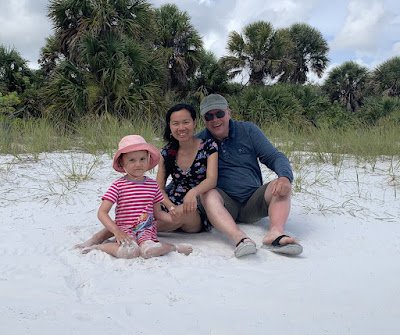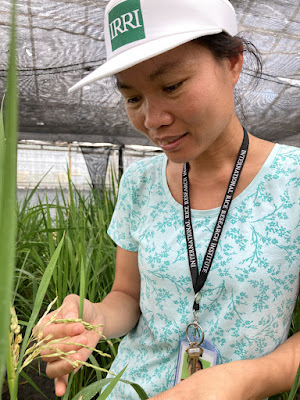The daughter of a smallholder farming family in Vietnam, her father dissuaded her from pursuing a career in agriculture, as he thought it was not a path to prosperity. But rather than be discouraged, she took it as a challenge to do her part to change the lives of rice farmers, like her father, for the better. In this in-depth interview with Van, we asked this passionate scientist what drew her to her field of phytopathology, and why she made the life-changing decision to move her family halfway around the world from Germany to the Philippines to become a part of IRRI.
Can you introduce yourself and share more about your early education and professional years?
My name is Van Schepler Luu and I am a molecular phytopathologist with a background in molecular biology and plant breeding. I did my undergraduate study at the Vietnam National University of Agriculture and worked on multiple rice breeding projects aiming at disease resistance and high grain quality. I graduated with a Master of Bioscience degree in Molecular Cellular and Developmental Biology of Plants from the University of Heidelberg and did my Ph.D. at the Max Planck Institute for Chemical Ecology in Germany. My Ph.D. project was on discovering novel defense mechanisms in a wild plant-pathogen system, where I identified a group of plant secondary metabolites and root-associated microbes that increased plant resistance against native fungal pathogens.
Before moving to IRRI, I worked as a Rice Team group leader at the University of Düsseldorf in Germany for 4.5 years. I was a part of a large Health Crops Consortium funded by the Bill & Melinda Gates Foundation and worked on developing durable and broad-spectrum bacterial leaf blight-resistant rice for Asia and Africa using genome editing.
I joined IRRI to lead the Plant Pathology and Host Plant Resistance group. It is a privilege for me to continue the impactful science history of IRRI in general and the plant pathology group in particular.
Why did you choose your particular field of study?
I realized what I wanted to do in life very early on but I did not map out nor expect how my path would be. I am rooted in agriculture and grew up with rice farming since my parents are smallholder farmers in a village in the Red River delta.
When I was a child, my father said, "If you don't want to be poor, then study and get out of agriculture". The sentence stayed in my head forever and I asked myself: Why is that so and why do farmers remain poor? I found that was unfair because Agriculture is the root of our civilization and the foundation of our society. I wanted to help rice farmers, but I did not know how. My simple thought was we probably need more innovation in agriculture. That was why I chose to study the newest topic in Agriculture at that time, plant biotechnology. With intensive agriculture studies and the experiences I gained along the way, I found my early thought was true, yes, we need more innovation in agriculture. And to have good innovation in agriculture, we need to understand plant genetics and we need to understand the interactions between plants and other counterparts, including microbes and insects. That is why my research area has mainly focused on studying and advancing plant genetics and plant-microbe-insect interactions. Besides, I realized that innovation is good on the one hand; on the other hand, how to transform research innovations into practical solutions and create impacts with them is as important as the innovation discovery itself. For this, IRRI is the best place to work.
Tell us about your family and other interests outside of your work.
I have a very supportive family. My husband refused to be a CEO of an NGO to support my career and stay supportive wherever I go. My daughter is five years old and always brings great joy and happiness when I come home.
I love growing trees, vegetables, and flowers. My daughter said: "We need to save the earth because the earth saves us". And she said when she grows up, she wants to be the person who collects all the garbage and I will be the one who plants trees.
 |
| Me with my husband and daughter |
How did you learn about IRRI? What made you apply for a job at the institute?
I learned about IRRI around 15 years back when I was in my undergraduate program and learning rice genetics. At that time, IRRI was the most innovative research institute regarding rice genetic discovery. The gene discovery program at IRRI was famous; so many significant QTLs were discovered here at IRRI. IRRI was the source of advanced materials for many breeding programs worldwide.
Since then, I have always wanted to go to IRRI because, to me, IRRI is The Institute of rice. Unfortunately, I had not gotten a chance to visit IRRI and I had to wait until I finally joined IRRI as a scientist II. I want to be a part of the IRRI scientific network, a part of IRRI's history. More importantly, I want to develop and bring innovative solutions to farmers' hands to reduce rice farmers' poverty. That is the reason why I joined IRRI.
You received a number of job offers from similarly reputable organizations. What made you choose IRRI over the rest? What was your decision-making process?
I chose to become a new leader of the Plant Pathology and Host Plant Resistance group at IRRI over other offers because of several reasons. The first reason is because of IRRI's history on rice genetics and advancement as I explained above, meaning that the resource for doing rice research at IRRI is huge (thinking about the gene bank and all rice genetic materials available). The second reason is that I believe with this position, I will have a great team and network support to realize many things I want to do to advance our breeding innovation in terms of increasing rice resistance to pathogens and pests. The third reason is that I believe any innovation I develop here at IRRI will be taken to farmers, and I can see relatively quickly if my work has any meaningful impact that aligns with my own mission.
It was not an easy decision in terms of moving my family to the other side of the world as well as there has been quite some uncertainties at IRRI recently. It took a lot of encouragement and support, not only from family and friends but also from my mentors. I am fortunate to have many great mentors along my path and they always provide me with advice and support whenever I need it.
How has your experience in IRRI been so far? What were your impressions about IRRI before being employed and have they changed now that you are part of the institute?
I love IRRI! That is what I can say now after one month of working here. It is way more than I expected! My team members are great. They are experts in their field and in what they are doing. They provide a constructive and lively working atmosphere and they show their enthusiasm for science during our discussions. I feel like being on a sailing board where all team members know what they have to do and I just need to find where we want to sail to.
I am amazed by how supportive the IRRI's scientists are. All people whom I have met so far have provided me with great welcomes, excellent advice and discussions. Many of us will have direct projects together, and I look forward to working closely with IRRI's scientists.
 |
| My team and I during a field trip to check rice diseases in IRRI's field |
Are there any new developments/ technologies/ advances that you are excited about and look forward to being a part of?
In general, I am very interested in advanced breeding technologies because I think they can substantially move our rice breeding ahead. New tools such as genome editing, new generation sequencing including single-cell sequencing, pan-genomes and microbiome, if combined and utilized correctly, can significantly impact our rice research and breeding programs.
Interested in working with passionate scientists making a difference? Learn more about the work we do at irri.org, visit our global careers page, and follow us on our social media channels.
###


No comments:
Post a Comment